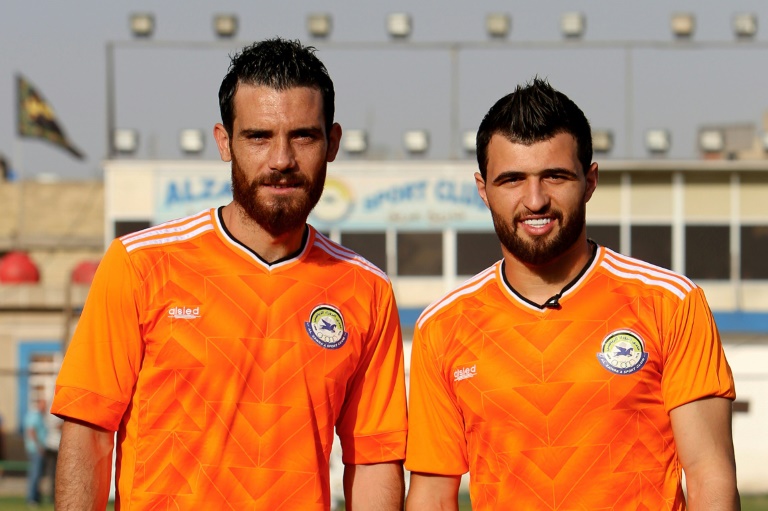A decade ago, Iraqi footballers used to take refuge in neighbouring Syria to pursue their career but the tables have turned in the tumultuous world of Middle East conflicts.
Nadim Sabagh remembers the Iraqis who played at Tishrin, his club in the northern metropolis of Aleppo that was to turn into a hotspot in Syria’s devastating conflict.
Today, he has signed up for a second season with Al-Zawra, a leading side in the Iraqi capital.
The 32-year-old Syrian international quit his country back in 2011 at the outset of the war and first played for Arbil, the biggest club in Iraqi Kurdistan.
Fellow Syrian Mahmud Khadduj held out four years longer before joining him in exile.
He says he “remembers very well” days when they would be training at the stadium of Ittihad, another Aleppo side, “as rockets and bullets rained down”.
Back in 2015, as Aleppo was being pulverised in clashes between government forces and rebels, as well as by jihadists and Russian air strikes, Khadduj decided to call it a day.
His escape came in the form of a contract with a club in Karbala, a Shiite city south of Baghdad.
“I wasn’t the only one. Several of my teammates joined clubs outside Syria,” said Khadduj, a midfielder who has now signed up with Naft al-Wassat, a leading club in the Iraqi league.
With entire blocks in several cities reduced to rubble by the six-year-old conflict, many football stadiums have suffered the same fate, leaving players and staff redundant.
– ‘Back to life’ –
Many players have gone abroad because “we have no other job to make a living”, Sabagh, in an orange shirt marked with the number 32 on the back, said at a training session in Baghdad.
At the Iraqi Air Force Club’s Al-Jowa al-Jawiya stadium in Baghdad, the Syrian accent of deputy coach Mohammed Aqil came through loud and clear as he instructed his players.
The 35-year-old former coach of Aleppo’s Ittihad explained that sports facilities back home have taken a battering.
“Today, Syrian football is trying to come back to life after years of having stadiums rendered useless because of fighting or their team dispersed,” either into exile or by taking sides in the conflict, he said.

Syrian football players Nadim Sabbagh (L) and Hussein Jawid, who now play for Baghdad’s Al-Zawra FC
For Hussein Jawid, 28, who played with Al-Huriya, another Aleppo club, there is no going back.
In Baghdad, where relative calm reigns although bomb attacks are not uncommon, Jueid said he has found “stability” since moving in 2012 and hopes to play out the rest of his career with Al-Zawra.
For some players, Iraq is a stepping stone to more lucrative and high-profile careers in Saudi Arabia or Kuwait.
Alaa al-Shibli, after spells in Kurdistan and Baghdad, has hit the jackpot, joining the mighty Zamalek in the Egyptian capital Cairo, a club crowned champions of Africa several times.
In a spectacular run for Syrian football, the national team made the playoffs for the 2018 World Cup in Russia, narrowly losing out to Australia this month.
Sabagh and Jawid have repeatedly taken leaves of absence from their Iraqi clubs to don the Syrian national jersey in the qualifiers.
The Syrian players have bittersweet memories of their homeland which they are still keen to represent.
“Before going to training, I opened Facebook and discovered that one of my teammates who I loved had been killed,” said Nassuh Nakdali, 24, who comes from Aleppo but now plays for Naft al-Wassat in Najaf.
Mahmud Khadduj, his teammate who represented Syria for two years until 2015, recalls how he used to train at Ittihad “under a hail of rockets and bullets”.
“My heart has always been and will always remain with the Syrian team,” said Khadduj.






